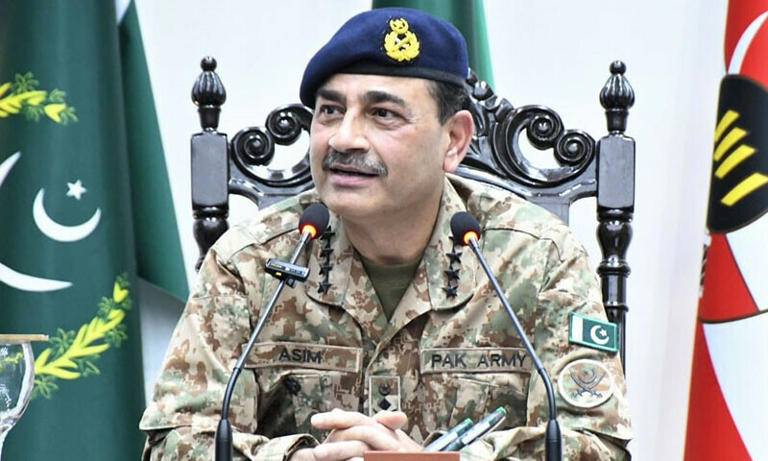Pakistan’s Stance: No Compromise on Sovereignty Amid Rising Regional Tensions
Introduction
In a period marked by escalating regional tensions, Pakistan’s Chief of Army Staff (COAS), General Asim Munir, has firmly stated that any violation of Pakistan’s sovereignty will be met with a decisive response. This declaration comes in the wake of heightened hostilities following a deadly attack in Indian-administered Kashmir, which India attributes to Pakistan—a claim Islamabad vehemently denies. As diplomatic relations between the two nuclear-armed neighbors deteriorate, General Munir’s statements underscore Pakistan’s unwavering commitment to its national integrity.(The Express Tribune)
COAS General Asim Munir’s Firm Message
Addressing participants of the 15th National Workshop Balochistan at the General Headquarters (GHQ) in Rawalpindi, General Munir emphasized that Pakistan seeks peace but will not tolerate any infringement on its sovereignty. He stated, “Pakistan seeks peace in the region and beyond, however, if Pakistan’s sovereignty and territorial integrity are violated, Pakistan will respond with full force to preserve its national prestige and the wellbeing of its people.” (The News)
This strong stance reflects Pakistan’s broader security policy, especially concerning the volatile situation in Balochistan, where foreign-sponsored terrorism remains a significant threat. General Munir highlighted the government’s ongoing efforts to improve the socioeconomic conditions in the province, aiming to counteract the narratives of those seeking to destabilize the region. (The Express Tribune, GNN – Pakistan’s Largest News Portal)
Escalating Tensions with India
The recent attack in Pahalgam, Indian-administered Kashmir, which resulted in the deaths of 26 individuals, has further strained India-Pakistan relations. India accuses Pakistan of harboring the perpetrators, while Pakistan denies any involvement and has offered to cooperate in an international investigation. In response to the allegations, Pakistan has placed its military on high alert, citing intelligence reports suggesting potential Indian aggression. (AP News)
Diplomatic ties have suffered, with both countries expelling each other’s diplomats and suspending airspace. Additionally, India has unilaterally suspended a crucial water-sharing treaty, affecting the flow of the Chenab River into Pakistan. These actions have heightened fears of a broader conflict between the two nations.(AP News)
International Mediation Efforts
Amid the rising tensions, Iran’s Foreign Minister Abbas Araghchi visited Pakistan to mediate between Islamabad and New Delhi. He held separate meetings with Pakistani President Asif Ali Zardari and Prime Minister Shehbaz Sharif, who expressed gratitude for Iran’s peace efforts. Araghchi is scheduled to visit India next as part of the mediation process. (AP News)
The United Nations has also called for restraint. UN Secretary-General Antonio Guterres emphasized, “Make no mistake: A military solution is no solution. Now is the time for maximum restraint and stepping back from the brink.” He reiterated the UN’s readiness to support initiatives promoting de-escalation and diplomacy. (AP News)
Pakistan’s Military Preparedness
In a demonstration of its military capabilities, Pakistan recently test-fired short- and medium-range missiles. The military stated that the Fatah surface-to-surface missile, with a range of 120 kilometers, was launched from an undisclosed location. These tests are part of Pakistan’s routine military exercises but also serve as a signal of readiness amid the current tensions. (AP News)
General Munir has reiterated that Pakistan’s armed forces are fully prepared to defend the nation’s sovereignty. He warned that any military misadventure by India would be met with a swift and resolute response, emphasizing the military’s commitment to national defense. (Daily Times, Dawn)
The Broader Context
The Kashmir region has long been a flashpoint between India and Pakistan, with both countries claiming it in full but controlling parts of it. The recent events have reignited fears of a potential military conflict, which could have devastating consequences given the nuclear capabilities of both nations. The international community continues to urge both sides to engage in dialogue and avoid actions that could escalate the situation further.
Conclusion
General Asim Munir’s unequivocal message underscores Pakistan’s stance on national sovereignty amid escalating regional tensions. While Pakistan expresses a desire for peace, it remains prepared to defend its territorial integrity against any threats. The situation calls for measured diplomacy and restraint from all parties involved to prevent further escalation and ensure regional stability.(Daily Times)
